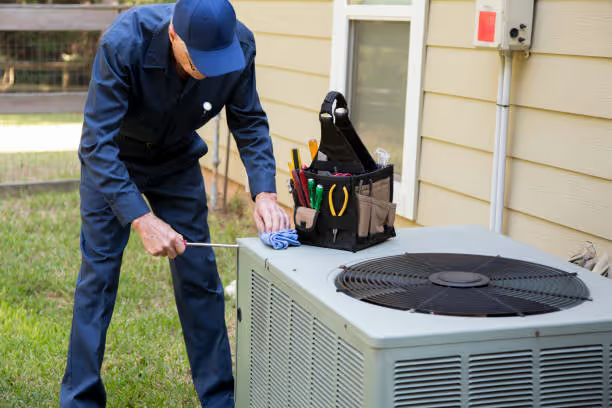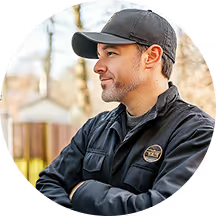Furnace Maintenance in Port Jefferson, NY
Keeping your furnace serviced and tuned is one of the smartest ways to protect your home, reduce heating costs, and avoid midwinter breakdowns. In Port Jefferson, NY, coastal weather, humid summers, and cold, damp winters put extra stress on heating systems. Salt air and older chimney systems common in Long Island homes increase corrosion and venting risks, making regular furnace maintenance essential for safety, efficiency, and longevity.

Why seasonal furnace maintenance matters in Port Jefferson
- Coastal corrosion and humidity accelerate wear on burners, flue components, and electrical connections.
- Older homes in the area often have masonry chimneys, cast-iron furnaces, or mixed HVAC systems that need careful vent and heat exchanger inspections.
- Cold snaps increase demand on furnaces; a well-tuned system runs more reliably and uses less fuel.
- Carbon monoxide risk rises when drafts, cracks, or blocked flues are present—seasonal safety checks reduce that risk.
Common furnace maintenance issues in Port Jefferson homes
- Dirty or neglected filters causing reduced airflow and higher energy use
- Fouled burners or failing ignition systems that lead to delayed starts, cycling, or incomplete combustion
- Corroded or cracked heat exchangers—especially in older units or systems exposed to salty coastal air
- Blocked or poorly drafted flues and vents from bird nests, debris, or masonry deterioration
- Worn blower motors and belts producing reduced airflow or noisy operation
- Thermostat calibration drift causing uneven temperatures and short cycling
What a comprehensive seasonal furnace service includes
A professional tune-up typically covers safety, performance, and preventive tasks. Most thorough furnace maintenance visits last 60 to 90 minutes and include:
- Filter replacement or inspection
Replace disposable filters or inspect/reclean reusable filters. Proper filtration restores airflow and protects internal components. - Burner and ignition system inspection
Clean burners, check ignition timing and flame quality, and verify consistent start-up. This reduces fuel waste and missed cycles. - Heat exchanger and flue checks
Visual and mechanical inspection for cracks, corrosion, or leaks. In Port Jefferson, attention to salt-induced corrosion and chimney condition is critical. - Safety and carbon monoxide (CO) testing
Measure combustion byproducts and CO levels at the furnace and in the flue. Verify venting integrity and draft to protect occupants. - Combustion analysis and performance tuning
Adjust fuel/air mixture for optimal combustion efficiency. Proper tuning can lower fuel use and improve heat output. - Blower and airflow optimization
Clean blower wheel, check motor operation, measure static pressure, and balance airflow to eliminate hot/cold spots. - Electrical and control inspection
Tighten connections, test safety controls and limit switches, and inspect the thermostat for proper communication. - Lubrication and mechanical checks
Lubricate bearings where needed, inspect belts and pulleys, and ensure smooth mechanical operation. - Vent, chimney, and outdoor termination inspection
Clear obstructions from outdoor vents and check chimney liners or caps for deterioration or animal intrusion.
What to expect from a furnace maintenance plan
Maintenance agreements vary, but most include annual or biannual inspections timed before heating season, priority scheduling for urgent repairs, and discounts on parts or diagnostic fees. A well-designed plan provides:
- Scheduled seasonal inspections to prevent last-minute emergencies during peak cold
- Documentation of maintenance for warranty compliance—many manufacturers require regular servicing
- Consistent performance tracking so recurring problems can be identified and fixed before failure
Benefits of regular furnace maintenance
- Improved safety — early detection of cracks, leaks, or venting issues reduces CO exposure risk.
- Lower operating costs — a tuned furnace often uses 5-15% less fuel compared with unmaintained equipment.
- Greater reliability — routine checks greatly reduce the chance of midwinter breakdowns.
- Extended equipment life — cleaning and calibrating parts reduces wear and delays replacement.
- Fewer emergency repairs — identify small issues early when repairs are faster and less expensive.
- Cleaner indoor air — proper filtration and clean components reduce dust and airborne irritants.
Diagnostic details homeowners should know
During maintenance, technicians use visual inspection and diagnostic tools—combustion analyzers, CO detectors, multimeters, and airflow meters—to determine system health. Key checks that protect your home:
- Measuring CO at the furnace and vent ports to ensure safe combustion
- Testing ignition cycles and flame sensors to catch intermittent start issues
- Inspecting heat exchanger condition visually and with pressure/draft tests where needed
- Verifying correct gas pressure and fuel delivery performance on gas furnaces
- Measuring static pressure and airflow to spot duct or filter-related restrictions
Practical maintenance tips for Port Jefferson homeowners
- Replace disposable filters every 1–3 months during heavy use seasons; check monthly during cold months.
- Keep outdoor intake and exhaust terminations clear of debris, ice, and snow. Coastal properties should inspect for corrosion more frequently.
- Test CO alarms monthly and replace batteries as needed; install alarms near sleeping areas.
- Keep vents and registers unobstructed and vacuum dust from return grilles regularly.
- Note unusual sounds, smells, or cycling behavior and log them to share with your technician at service time.
The cost of skipping maintenance
Delaying annual furnace maintenance increases the risk of breakdowns, higher fuel bills, and unsafe conditions. Small problems compound—dirty burners, for example, can cause inefficient combustion which accelerates heat exchanger deterioration. Many warranties and home insurance policies recognize the value of regular maintenance and may require documentation for coverage of certain failures.
Final notes on timing and frequency
For most Port Jefferson homes, an annual pre-winter inspection and tune-up is recommended. Homes with heavy use, older equipment, or exposure to salty coastal air may benefit from semiannual checks. A single thorough tune-up before the heating season helps ensure safety, optimize efficiency, and provide dependable comfort through the cold months.
Regular furnace maintenance protects your home, keeps heating bills in check, and reduces safety hazards—especially important in Port Jefferson where coastal conditions and older housing stock increase system stress. Prioritize a professional seasonal inspection to keep your furnace running safely and efficiently all winter.
Customer Testimonials
Hear directly from homeowners who trust Bobby O’s HVAC Inc. for fast response times, honest service, and lasting comfort.











